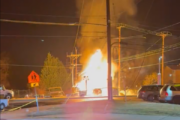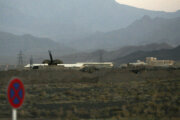Hear our full conversation on WTOP’s podcast “Beyond the Fame.”
The Senate impeachment trial of former President Trump is underway after a mob stormed the U.S. Capitol on Jan. 6, convinced that the election was somehow “stolen.”
If you’re troubled by this age of “fake news,” Newton Minow knows exactly how we got here, as this year marks the 60th anniversary of his iconic 1961 speech calling television a “vast wasteland” as chairman of the Federal Communications Commission.
“People don’t hear both sides,” Minow told WTOP. “Some networks only cover one side of an issue. That has led to a lack of consensus in America, which is a dangerous thing in a democracy. … [Sen.] Pat Moynahan said it best: ‘This is a free country, everyone is entitled to his or her own opinions, but no one is entitled to their own facts.'”
Born in 1926, Minow served in World War II, attended law school at Northwestern University in Chicago and became assistant counsel to Illinois Gov. Adlai Stevenson.
“[RFK] and I became friends in the ’56 Stevenson-Eisenhower campaign,” Minow said. “The Kennedys knew I was deeply interested in the development of television. I urged Stevenson in ’56 to choose [JFK] as his running mate. That didn’t work, but Kennedy got the nomination for president in ’60 and asked me to join his administration.”
Thus, he embarked on a journey out of a movie: Mr. Minow Goes to Washington.
“We didn’t have a lot of money and it was a difficult thing to do, but we packed up my wife and three children and we moved to Washington,” Minow said. “I had been a law clerk at the Supreme Court 10 years before, but this was the great adventure.”
The night before Minow’s famous speech, JFK wowed the National Association of Broadcasters with his own speech after seeking Minow’s advice at the White House.
“Changing his shirt, he said, ‘What do you think I should say to the broadcasters?'” Minow said. “I said, ‘I think, Mr. President, you ought to tell them what a great public service broadcasting provided two days ago when our first astronaut went into space and it was covered live on radio and television so everybody in America could see it.'”
Fittingly, they invited NASA Commander Sam Shepard along to the NAB convention.
“We drove there with the president, vice president and the Shepards,” Minow said. “The president, no notes, got up and gave an absolutely perfect 10-minute speech saying that the broadcasters had done this great public service for the country. … The president left to great applause. My speech the next day had the reverse reaction.”
Remembered for the line “vast wasteland,” Minow’s speech was actually a balanced critique: “When television is good, nothing — not the theater, not the magazines or newspapers — nothing is better. But when television is bad, nothing is worse.”
“Sherwood Schwartz, the guy behind ‘Gilligan’s Island,’ didn’t like my speech,” Minow said. “He sent me a note saying he was going to name the boat [S.S. Minnow] after me because it sunk. On my 90th birthday, my law partner gave me one of the life savers.”
His daughter Nell, founder of MovieMom.com, remembers her dad’s sudden fame.
“I was 9,” Nell said. “After the speech, [he] got on a plane back to Chicago — because we were still packing to move — and came to my Brownie father-daughter dinner. … He was on the cover of Newsweek and there were a lot of political cartoons. … My friends at school would say, ‘Tell your dad I like this TV show and not that TV show.'”
At the same time, Newton signed the original license for PBS affiliate WETA, created the Commission on Presidential Debates and funded the launch of “Sesame Street.”
“To me, the children were being badly shortchanged by not having adequate children’s programming,” Newton said. “There were too many commercials, there were not enough educational [programs], the network news was 15 minutes. I felt that this great gift, this great technology was being wasted. That’s what I meant by ‘vast wasteland.'”
Back then, there were only three networks featuring trusted anchors like Edward R. Murrow and Walter Cronkite, whose coverage abided by the Fairness Doctrine of 1949.
“The Fairness Doctrine was a policy adopted by the FCC which had two parts,” Newton said. “First, encouraging broadcasters to cover controversial issues. Second, they would give not just one side; they would be balanced with different views of that issue. … I’m sorry it has been abandoned, because our country has been so badly divided.”
Indeed, the Fairness Doctrine was scrapped in 1987, allowing the birth of Fox News in 1996, claiming “fair and balanced” on “Hannity & Colmes” that quickly became just “Hannity.” MSNBC responded on the left, CNN tried to hold the middle, while Fox pointed to Dan Rather and Brian Williams as examples of “mainstream media” bias.
“We have people living under two sets of facts,” Newton said. “People even say it’s OK to have a set of ‘alternative facts.’ You can’t have alternate facts. A fact is a fact.”
These two silos of information are only getting worse. In the past month, Fox News fired its “decision desk” chiefs Chris Stirewalt and Bill Sammon for calling Arizona for President Joe Biden, while expanding its primetime opinion shows to start at 7 p.m.
“When Tucker Carlson or Sean Hannity are saying things that are actually not true, provably not true, they respond, ‘Oh, it’s just opinion,'” Nell said. “I don’t care if they put the word ‘commentary’ at the bottom of the screen, people don’t know the difference. It’s still called ‘Fox News’ and people take it very, very seriously.”
Today, Fox News is being outflanked on the right by One America News and Newsmax, which was forced to issue retractions after a lawsuit by Dominion Voting Systems, while Smartmatic’s lawsuit forced Fox News to cancel “Lou Dobbs Tonight” last week.
“Nobody seems to be able to differentiate,” Nell said. “What can the government do? We do have the First Amendment, people can say whatever they want, but they’re not allowed to shout ‘fire’ falsely in a crowded theater. I think we’ve gotten to that point.”
Social media is now the new “vast wasteland,” culminating in Trump’s Twitter ban.
“The biggest issue now is not so much with television as it is with social media,” Newton said. “There are certain limits on speech when it comes to violence, hate speech. Lines can be drawn. … In the impeachment trial, you’re going to see evidence where social media provoked and encouraged violence. That can not be the future.”
Regardless of your political affiliation, we should all work from a shared set of facts.
“I’m a Democrat [but] I hate to see what’s happened to the Republican Party,” Newton said. “In our democracy, we need two strong parties and I admire greatly our young congressman from Illinois, [Adam] Kinzinger, who is asking the Republican Party to return to its basic principles and not allow the far, far right extremes to dominate.”
What’s the solution? Can we bring back the Fairness Doctrine?
“What I’d like to see is a statement from Biden or Harris saying, ‘Look, I’m not telling you who to believe, I’m telling you that whatever you listen to, check it out,'” Nell said. “Do they correct themselves when they make a mistake? Do they name sources? Link to the original documents? … I love WTOP because it gives you the straight story.”
Her father also has great respect for WTOP’s history of objectivity.
“WTOP, it seems to me, is one of those great, great stations that understands what fairness is and presents all sides,” Newton said. “Phil Graham had The Washington Post and WTOP. He and I worked together to build the first communications satellite.”
He once told JFK that a satellite is more important than any public servant.
“President Kennedy once said to me, ‘Why are you bugging us so hard about the communications satellite program?’ I said, ‘Mr. President, communications satellites are more important than sending a man into space.’ The president said, ‘Why?’ I said, ‘Well, communications satellites send ideas — and ideas last longer than people.”
Even so, his life’s work earned him a Presidential Medal of Freedom in the 2016 class of Bill Gates, Tom Hanks, Michael Jordan, Bruce Springsteen, Cicely Tyson, Ellen DeGeneres, Robert Redford, Robert De Niro, Diana Ross and Kareem Abdul-Jabbar.
“It was the greatest honor you could get as an American,” Newton said. “The thrill was having my entire family there. … It was such an extraordinary group of diverse people who have contributed so much to our country, so it was the thrill of a lifetime.”
Reminiscing on their trip to the White House, the father and daughter started laughing.
“We were waiting for the ceremony to begin; one of the other recipients of the medal was Lorne Michaels, the founder of ‘Saturday Night Live,'” Nell said. “My father said to him, ‘I think you owe the Commission on Presidential Debates some royalties.'”
“You know what he said to me?” Newton said. “‘We couldn’t afford it.'”
In that case, Gilligan should pay him royalties each time the nation’s weather starts getting rough. If not for the courage of this fearless man, our country would be lost.
Listen to our full conversation here.






